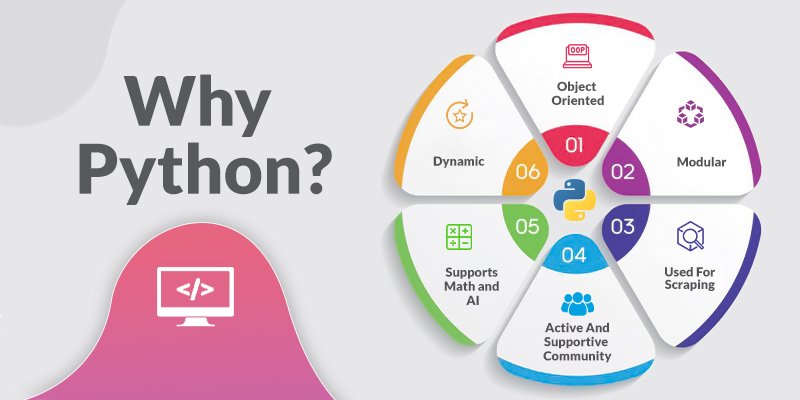Python has grown into one of the most widely-used programming languages in the world, known for its simplicity and versatility. It is used in various fields, from web development and automation to data science and artificial intelligence. When considering Python for software development, there are a few key factors to keep in mind to ensure effective and efficient use of the language.
1. Why Choose Python for Software Development?
Python’s popularity is driven by several advantages that make it an excellent choice for many types of software development projects:
- Ease of Learning and Readability: Python’s syntax is designed to be simple and readable, which makes it an ideal choice for beginners. The language uses indentation instead of braces, making the code easier to understand and maintain.
- Versatility: Python can be used for a wide range of applications, including web development (using frameworks like Django and Flask), data analysis, machine learning (with libraries like TensorFlow and scikit-learn), automation, and scripting.
- Extensive Libraries and Frameworks: Python has a vast ecosystem of libraries and frameworks that speed up development. For example, Flask and Django for web applications, NumPy and pandas for data manipulation, and PyTorch for machine learning.
- Cross-Platform Compatibility: Python runs on all major operating systems, including Windows, macOS, and Linux, making it easier to develop cross-platform applications.
2. Key Considerations When Using Python for Development
1. Performance
One of the main drawbacks of Python is its performance. Python is an interpreted language, which means it is generally slower than compiled languages like C or Java. However, for most applications, the performance is more than adequate, and if speed is critical, developers can optimize by using tools like Cython or rewriting performance-critical sections in a compiled language.
Consideration: For compute-intensive tasks, it’s important to be aware of Python’s limitations. If performance becomes an issue, explore optimizations or even hybrid solutions using Python and other languages.
2. Scalability
Python is not inherently designed for highly scalable applications out of the box, especially when it comes to handling concurrent processes due to the Global Interpreter Lock (GIL). However, Python can be made scalable through asynchronous programming and using libraries like asyncio for managing concurrency.
Consideration: When building large-scale applications, it’s crucial to leverage concurrency models, such as asynchronous programming or distributed systems using frameworks like Celery.
3. Dependency Management
Managing libraries and dependencies is an essential part of any Python project. Tools like pip and virtual environments help manage these dependencies, ensuring that projects remain isolated and dependencies don’t conflict between projects.
Consideration: Always use virtual environments like venv or pipenv to avoid dependency issues when working on multiple projects.
4. Testing and Debugging
Python’s popularity in part comes from its robust support for testing and debugging. Libraries like unittest, pytest, and mock allow for extensive unit and integration testing, ensuring code reliability and stability.
Consideration: Make testing an integral part of your development process. Automated testing with tools like pytest can help ensure your code remains bug-free and behaves as expected.
5. Security
While Python is generally considered secure, no language is immune to vulnerabilities. Developers need to consider security best practices when using Python, especially in web applications. Frameworks like Django come with built-in protection against common security threats like SQL injection and Cross-Site Scripting (XSS).
Consideration: Use secure coding practices, and for web development, ensure you are familiar with OWASP guidelines and the security features provided by your framework.
3. Popular Python Frameworks and Libraries
Python’s ecosystem is rich, offering powerful libraries and frameworks to help you build software quickly and efficiently:
Web Development:
- Django: A high-level web framework that encourages rapid development and clean, pragmatic design. Django is known for its “batteries-included” philosophy, offering built-in solutions for many common web development tasks.
- Flask: A lightweight, micro-framework for web development. Flask is more flexible and minimalistic, giving developers the freedom to choose their tools and libraries.
Data Science and Machine Learning:
- NumPy, pandas: For data manipulation and analysis.
- TensorFlow, PyTorch: For machine learning and deep learning applications.
- Matplotlib, Seaborn: For data visualization.
Automation and Scripting:
- Selenium: For automating web browser tasks.
- Requests: For making HTTP requests simpler and more human-friendly.
Testing:
- pytest: A robust testing framework that supports fixtures, parallel testing, and more.
- unittest: Built-in Python testing framework for writing unit tests.
4. When to Use Python
1. Web Development
Python is excellent for building web applications due to frameworks like Django and Flask. Whether you’re creating a simple website or a full-fledged web service, Python makes it easy to build and maintain scalable web applications.
2. Data Science and AI
Python has become the go-to language for data science and artificial intelligence due to its strong ecosystem of libraries. From data manipulation with pandas to machine learning with TensorFlow, Python has all the tools required for AI development.
3. Automation
For automating repetitive tasks, Python shines. Its simplicity, combined with libraries like Selenium and Requests, makes it easy to write scripts that automate web scraping, report generation, or data processing.
4. Prototyping
Due to its readability and speed of development, Python is ideal for prototyping. Developers can quickly test ideas and iterate over them without the need for lengthy setup processes.
Conclusion
Python’s versatility and ease of use make it one of the top choices for software development in 2024. Whether you’re working on web development, machine learning, automation, or data analysis, Python provides the tools and frameworks necessary to build robust applications. However, developers must be mindful of Python’s limitations in areas like performance and scalability, and they should leverage best practices like dependency management and testing to ensure success.
At TechsterTech.com, we leverage Python to build scalable, maintainable, and secure software solutions tailored to your business needs. Whether you need a web application or a data science solution, we can help you unlock Python’s potential for your project.
SEO Keywords:



